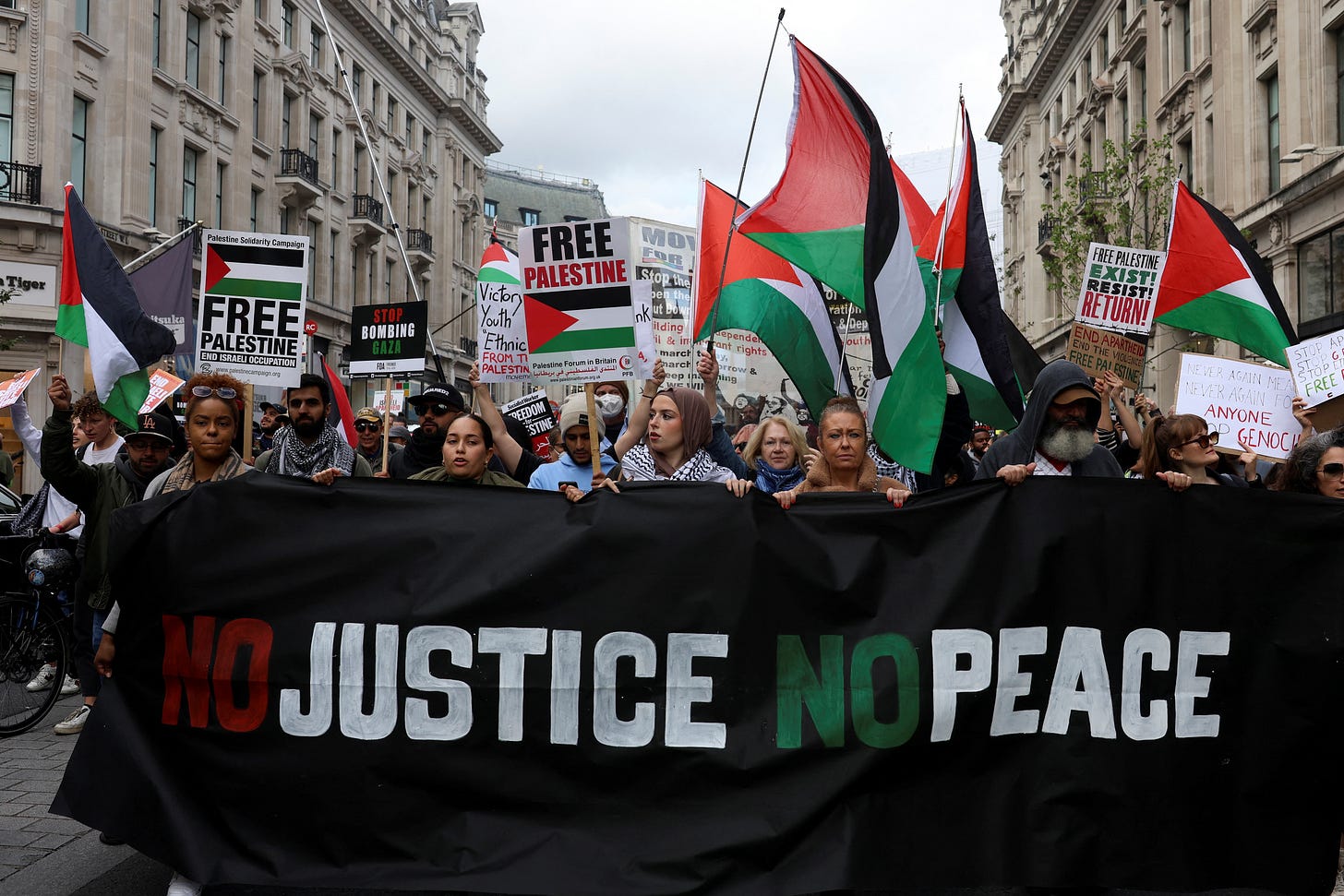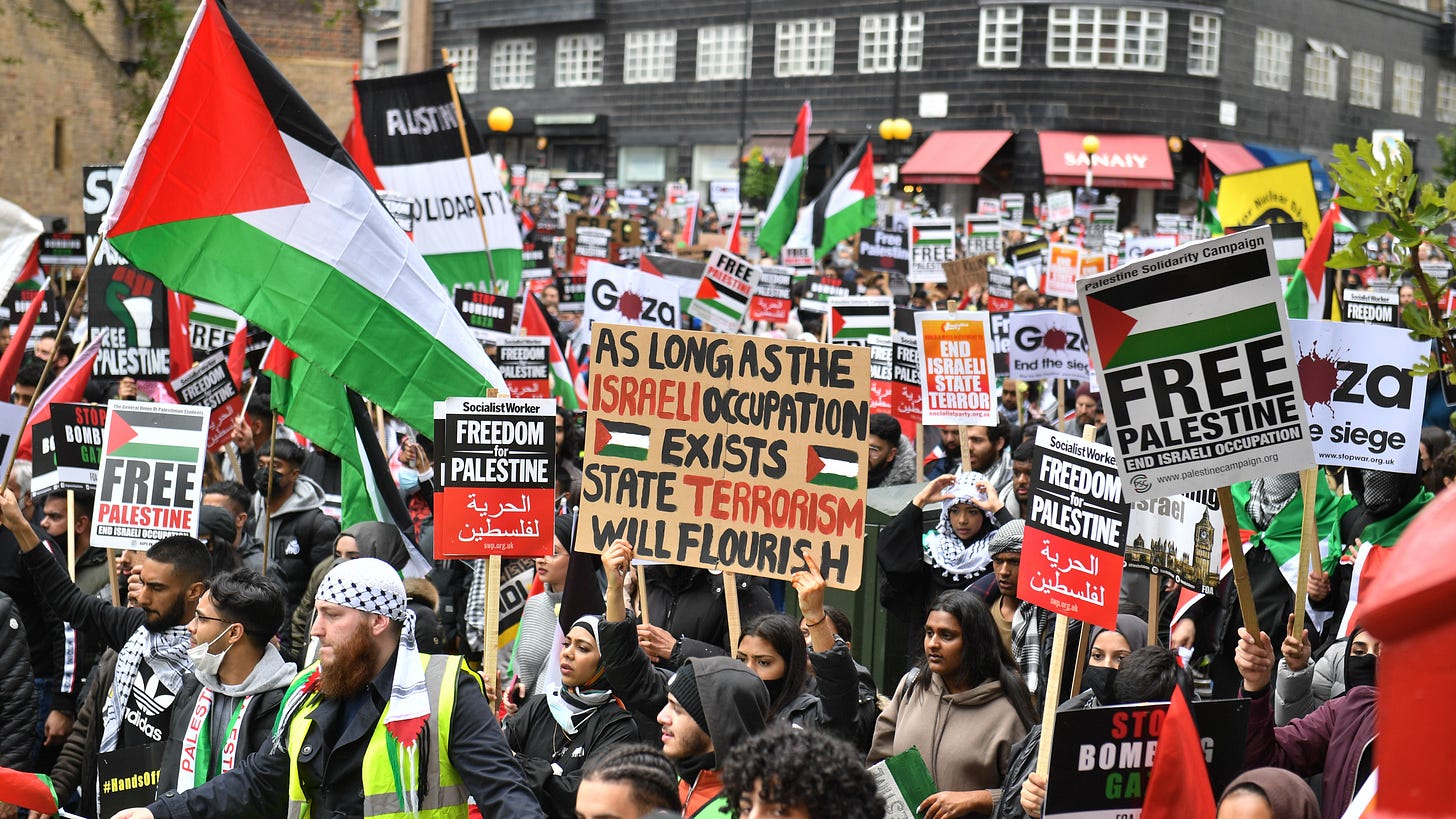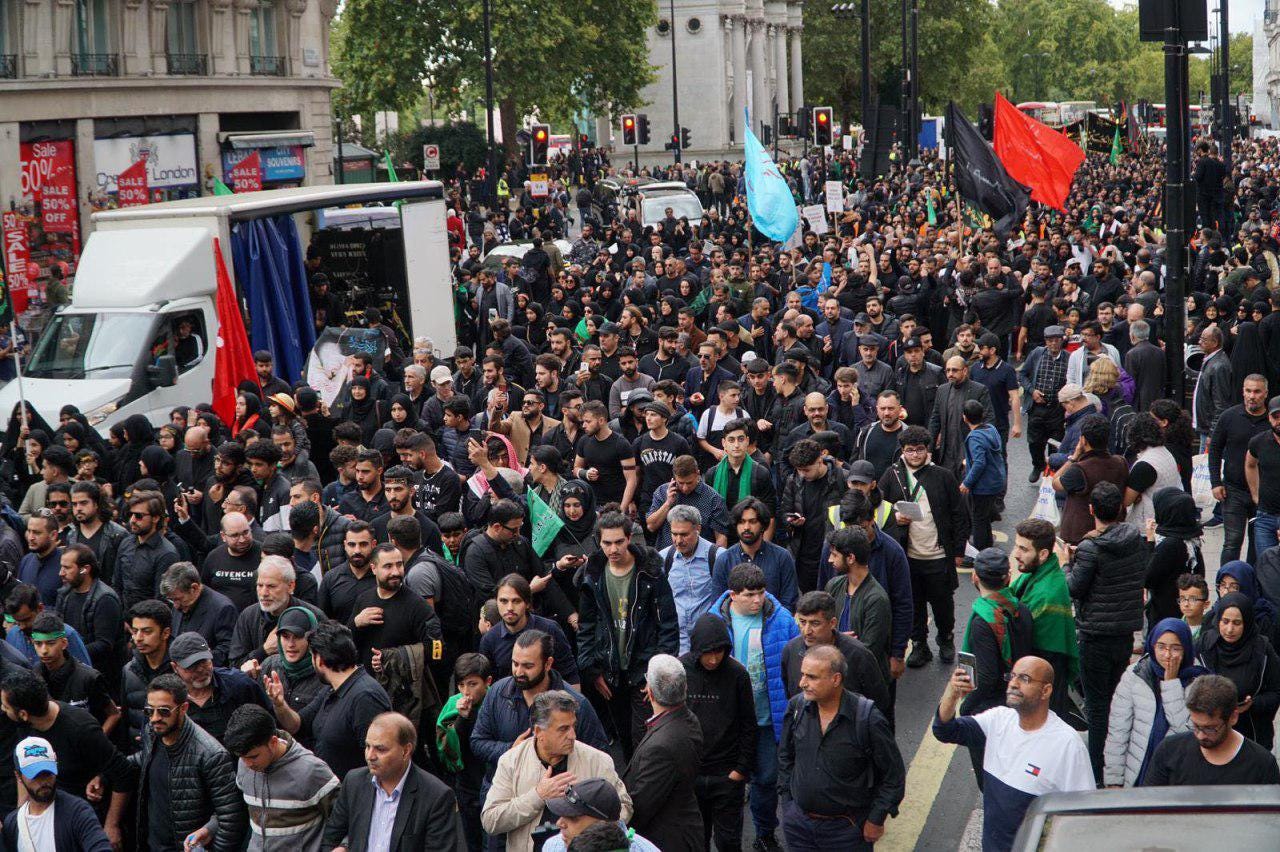Parallel Societies, Radicalized Youth, Growing Dissent - The West Has Failed to Assimilate Its Migrant Population
The Western world is starting to experience the repercussions stemming from open borders and a state unwilling to assimilate new arrivals with the indigenous culture.
A sea of green, white, and black banners marches down a busy street. In a foreign tongue, people chant out, “God is great!”. Onlookers, who refuse to participate in this cult, are verbally harassed and physically assaulted.
No, this isn’t Pakistan.
Or Syria.
Or Turkey.
This is Liverpool Street. London. 2023.
Bystanders could only watch in horror as this mass of black-clad agitators trudged through the Capital’s cobblestone streets this Monday, as thousands called on the government to push for a ceasefire in the burgeoning Israel-Palestine conflict.
While marches of solidarity with oppressed people are nothing new - after all, London and other liberal cities have a long history of social activism - what marked this one as different was how openly and brazen its participants flirted with religious fundamentalism. People carried signs depicting a lone soldier parachuting into an urban zone; a symbol that mirrors how some Hamas fighters descended on the party rave where they would unleash a brutal massacre that butchered up to a thousand Israeli civilians. Others waved the banners of the Taliban and ISIS.
Protests are, in of themselves, inherently good. They are, after all, the lifeline of a democratic system, giving people the opportunity to make their voices heard. What is not permissible, however, is the veneration of terrorists, which was readily apparent at all of these demonstrations.
The march itself is not important - what it symbolizes is. It’s a microcosm of a much deeper issue; another reminder that the assimilation processes of the West have abjectly failed and we are now reaping what we have sown.
Across the country, from London to Luton to Sheffield, we are witnessing the growing sectarian divide of our urban centres, brought about by decades of uncontrolled migration and an elite indifferent or blind to the failed implementation of their policies.
Just a few months ago, there were riots in Bradford between the Pakistani and Indian communities, who have segregated themselves into their own enclaves, over a dispute on a subcontinent half a world away. And most of the participants there weren’t recent migrants; they were second or third-generation immigrants whose families have lived in the UK for decades, hinting that a wider system of indoctrination has festered unabated.
These are not the signs of healthy pluralism.
One thing is abundantly clear: the liberal project of forging a multi-racial, multi-cultural society has not materialized. Instead, our cities have been carved up into a patchwork of linguistic and racial enclaves, that only intersect when forced to.
And what makes this all so tragic is that there is no way for our elite to face repercussions for their devotion to the orthodoxy of open borders. The promise of lower immigration yielded by Brexit has been squandered through a fusion of incompetence and revulsion for the public daring to challenge their ‘masters’.
It is worth remembering that, for millions of people, supporting Leave was about democratic accountability. Thanks to EU free movement rules, many felt the level of low-skilled immigration to the United Kingdom was too high, depressing wages and interfering with the social cohesion of their communities. Many Leave voters hoped that by returning immigration back to British national control, politicians would then use these powers they now possessed to lower immigration in line with the desires of voters.
On this metric, Brexit - or, more accurately, the government’s handling of it - has spectacularly failed. ONS statistics published this July showed that net migration has in fact more than doubled from the pre-Brexit level of 336,000 to over 700,000 in 2023. Some are predicting net migration for a single year could top one million.
How can anyone expect this to not result in anything else but social friction? 700,000 people, of varying different ethnicities and cultures, flooding into a country already heaving with people, with few checks and balances.
While our streets are swamped by Jihadist-sympathizers and our historical monuments are desecrated, where is the government? Any other nation that cared about maintaining order would’ve instantly deployed the army to quell this dissent, and yet all ours seems to be able to manage is meekly issue a letter condemning the slogans used by protestors.
Last week, Robert Jenrick, Minister for Immigration, tried to assuage fears by pledging to begin deporting people who amplify anti-semitic tropes or slogans in public. However, while this announcement is a noble pursuit, it does spark a fundamental question: ‘if the government is capable of stripping people of their citizenship, why has it taken them this long to do so?’ Why did the government not intervene when hundreds of Pakistani migrants in Rotherham spent decades abusing young, British girls in their web of sex-trafficking? Why did the government not strip the terrorists who butchered British soldiers in the streets of our capital of their citizenship? Why have they hesitated in moving against the mosques which regularly churn out anti-Western dogma to their devout followers and who receive large funds from religious fundamentalist groups, such as the Muslim Brotherhood?
So, the failure of assimilation isn’t just an example of political incompetence, it’s an example of a lack of political will.
If the government wants to actually address these underlying problems (I have my doubts), then it needs to act decisively and quickly.
The first step would be to either amend or exit from the archaic institutions and treaties that are curtailing the government’s flexibility when responding to the mass of people pouring into our borders. The ECHR and the UN Convention on Refugees have gone past their expiration date. It would be politically convenient to dispatch with them as soon as possible. Without their rigid constraints, the government will have a lot more manoeuvrability with which to push back against illegal immigration. So-called “interim measures” could be ignored and the UK would be able to deport illegal migrants back to their home of origin. And it’s arguable the government would not have to deal with every single immigration case. By simply toughening its approach to illegal migration, it would send a message to those camping in Calais that decades of tolerance was at an end, perhaps deterring thousands from even attempting the journey in the first place.
The next step will be to address legal migration, already mounting to a staggering 600,000 per year. The vast majority of legal migrants to the UK arrive through the government’s visa scheme, which has become a lot more lenient in recent years. All the government would have to do in this regard is simply scale back the number of visas being issued to bring annual migration back to a manageable level.
Finally, for those migrants still residing here, the government, working constructively alongside its institutions, needs to push for a more focused and overpowering assimilation regime. A few simple solutions include: halting the foreign funding of mosques and other religious organisations, forcing immigrants to attain a certain level of English before being allowed to gain citizenship, clamping down on anti-Western protests and demonstrations, and outlawing the importation of foreign practices, including halal meat and public prayer meetings.
However, these prescriptions are far from exhaustive. A key fault line of the debate on integration is where responsibility lies between local and central government. Local authorities are closest to many of the issues raised by the presence of migrants within their communities, and can to an extent impact on their access to jobs, housing, services and civic participation. They do not, however, control some of the levers that affect integration outcomes. Central government determines the extent of migrants’ rights to participate; is responsible for key areas of policy such as discrimination law; and shapes, to an extent, national media and public discourse.
A key step would be to further devolve integration mechanisms to local bodies, who can better tailor it to the circumstances of the local area, while still maintaining a degree of supervision from the central government to ensure that integration has been properly and adequately implemented.
The issue of assimilation should not be divided along a strictly right-left dichotomy. It is a quintessential issue that pertains to all members of society. The sooner we de-politicise integration, the quicker we can make progress on ensuring that our communities become socially cohesive.




